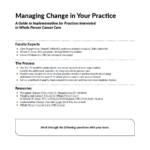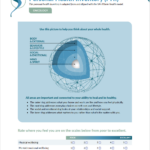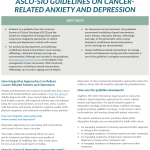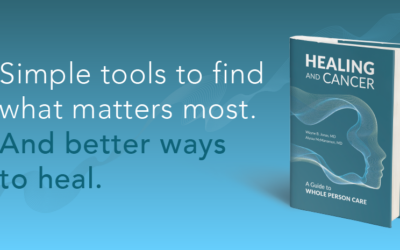“Survivorship visits, clinics, and care plans are informed by the actual person living with or beyond the cancer. This is where a HOPE visit can take center stage. Inviting a person in survivorship to complete a Personal Health Inventory (PHI), even if one had been completed earlier in the process, can allow what matters now to lead the discussion.” — Healing and Cancer
Life after cancer can bring forth its own set of unique challenges. Some patients may be quick to move on with their lives while others may struggle with the emotional scars of a cancer diagnosis and treatment. Establishing a “new normal” comes with long-term fears of recurrence, scans that may induce anxiety, and long-term effects of treatment such as peripheral neuropathy, pain or sexual side effects.
When active treatment ends and patients are moved to follow-up care, it can often bring up feelings of anxiety. They may feel abandoned or unsure of how to proceed after cancer treatment has ended. It’s crucial that patients are supported beyond the treatment phase. Asking “what matters” will help to establish what patients need and open up the conversation for meeting those needs. When a patient is active and engaged in their health, they will feel empowered in their health journey and actively work to prevent recurrence through healthy foods, exercise, and mind-body practices that can help them to keep their stress levels down.
- Helping Cancer Survivors Be Well at the Ann B. Barshinger Cancer Institute case study
- “Five Steps to a New Normal: Life After Cancer” blog post*
- The Pocket Guide to Patient Advocacy in Cancer* (PDF)
Looking to move towards a whole person approach?
- Use the linked worksheet developed with change expert Allen Shaughnessy, PharmD, MMedEd, professor of family medicine, Tufts University, to walk you step by step through the process
Personalized Care Across the Cancer Journey
Resources
Latest Blog Post
You Already Know How to Do Whole Person Care
An excerpt from Healing and Cancer: A Guide to Whole Person Care If you've never (until reading Healing and Cancer)…






